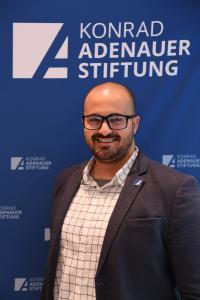Workshop
Détails
The world is facing a climate crisis caused, to a great extent, by the constant abuse of fossil fuels. Climate and energy researchers, activists, and experts have called for a global effort to mitigate the effects of the world's carbonated economy. More and more countries across the globe are steering towards decarbonizing their industry, electricity, and transportation, among other sectors.
A Green Hydrogen-powered future is becoming more tangible now that the necessary technological advancements, industrial transformations, and socioeconomic change are in course. Countries in Europe and the MENA region are considering the use of this highly abundant, efficient, and clean energy source in transport, heat, feedstocks, energy (storage), exports.
Green Hydrogen refers to the production of Hydrogen through electrolysis, powered by electricity generated from renewable sources. The aspiration of this initiative is that the MENA region becomes a global player and export hub of Green Hydrogen. Strategic partnerships and establishment of associated industries, partnerships in green economies and decarbonization, energy security and resilience, supply chains, joint investments, and beyond can help achieve this ambition.
In fact, Hydrogen is an energy storage medium that allows renewable energy to be stored in a supply-based and flexible manner. Therefore, it will help balance energy supply and demand. Hydrogen is, thus, an important ingredient of the energy transition, which represents the efforts undertaken and results achieved on renewable energy expansion and energy efficiency. This is essential for achieving the SDGs (in particular SDG7 and SDG13).
The role of Green Hydrogen as an energy storage solution has the potential to decarbonize various industries and support economic growth by setting the ground for a new export market. Thus, it became of paramount importance to identify and assess the opportunities offered by large-scale deployment of Green Hydrogen. Subsequently, integrating these opportunities into future updates of the national climate and energy planning and roadmaps will speed our efforts towards a low-carbon energy system.
This could be only achieved through collaboration and partnership in markets and business development, strategic enablers, policies, and regulations, among others.
In June 2020, Germany presented its national hydrogen strategy (NHS). It was one of the first countries worldwide to do so, even published before the European Union (EU). Germany aims to be greenhouse gas (GHG) emissions neutral by 2050. Green Hydrogen is considered a key tool in reaching this goal. Using hydrogen could result in the reduction of certain industrial GHG emissions, such as steel and cement, and is perceived as a potential game-changer for transport-related emissions as well.
An increasing number of MENA countries started to develop their national Hydrogen policies. Therefore, they need to be supported in doing so and explore the potential Green Hydrogen exportation to Germany and the EU in the future.
That said, Green Hydrogen production requires significant amounts of high-quality water. Hence, attention should be paid to ensuring that Green Hydrogen imports to Germany or Europe of Green Hydrogen does not impede the supply of renewable energy or exacerbate water scarcity in the MENA region. The aim is to achieve sustainable production along the entire supply chain.
There are exciting scientific opportunities to solve that great challenge. Potentially, one of them is the use of seawater and renewable energy sources to reduce Hydrogen-Water-Climate Nexus pressures.
This virtual workshop will present the current knowledge, state-of-the-art, and gaps in terms of Green Hydrogen technology in the MENA region and capitalize on it. Experiences from Germany and a selection of pioneer MENA countries will be shared as well. This workshop is expected to deliver a series of recommendations in form of concrete actions to be carried out in the following stage. Such actions should boost the know-how exchange and technology transfer between the different countries of the MENA region and also Germany, as a world pioneer.
The general aim of this one-day virtual workshop is to provide technical and policy recommendations and support to MENA countries in relation to their national hydrogen roadmaps. The hydrogen roadmap will help MENA countries achieve sustainable development without compromising scarce freshwater resources and taking into consideration climate pressures.
KAS - REMENA invites interested
- governmental representatives from MENA countries and Germany in charge of hydrogen national policies ;
- private sector/industry representatives;
- researchers working in the area of Green Hydrogen;
- representatives of regional organizations working on, or interested in, Green Hydrogen policy implementation.
For more information on the workshop's three panels and panelists, please consult the program by clicking here.
To attend the workshop, taking place on June 22, 2021, from 10:00 am to 14:00 pm GMT+0, please register here.
For more questions or concerns, do not hesitate to reach out to us at info.remena@kas.de




